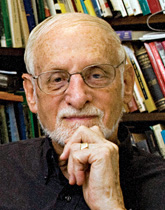Joel Tarr succinctly explains what he does: "I am a historian as well as a person concerned with contemporary problems. I try to bring history to bear on the issue."
Conducting research on urban issues—everything from transportation to environment to communications—has fueled a noteworthy career for the Carnegie Mellon history professor in Heinz College and in the departments of History and Engineering and Public Policy. He is an award-winning author and has served on the boards of several prestigious academic journals and influential regional and national associations. And, in his 41 years at Carnegie Mellon, he has done it all without a campus parking permit. He lives just a 10-minute walk from campus. ("Eight minutes if I walk fast.")
One evening in 1991, his commute and career collided—a car struck him in a campus crosswalk. He had no serious injuries, but 15 years later a student died when hit by a car while walking the path Tarr followed. The accident prompted Tarr, as well as students in his policy seminars, to examine the pedestrian safety issue as it evolved over time. Tarr and one of his students eventually testified before Pittsburgh's city council, successfully supporting Safe Streets Initiative, legislation that included the class' recommendations such as walk signals that visually count down when traffic lights will change.
Throughout his career, Tarr has demonstrated the importance of history to public policy problems, along with his scholarly work that emphasizes the role of technology in urban and environmental history. In recognition of his efforts, he recently received The Society for the History of Technology's Leonardo da Vinci Medal, the international society's highest honor.
—ROB CULLEN (HS'02)
Editor's Note: This marks the second year in a row a Carnegie Mellon professor received the award. You can read about David Hounshell here.




